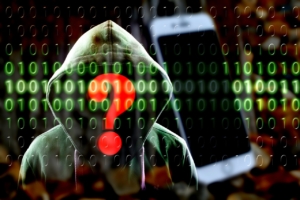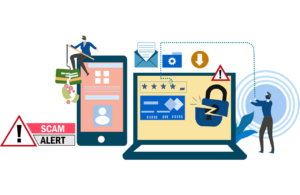When and How to Report a Cyber Attack Attempt
Should you report a cyber attack attempt? Even a small, seemingly insignificant one? The answer is almost always yes.
 There are two reasons to report a cyber attack. The first is to show cyber criminals that you take security seriously. The second is to gain safety in numbers. The more people who are aware of current attacks and techniques, the harder it is for criminals to operate. Remember that hackers and fraudsters depend on their victims knowing little no nothing about their scams. Spread the word, and you help others defend themselves. When enough people fight back or ignore scam and hacking attempts, criminals move on to easier targets.
There are two reasons to report a cyber attack. The first is to show cyber criminals that you take security seriously. The second is to gain safety in numbers. The more people who are aware of current attacks and techniques, the harder it is for criminals to operate. Remember that hackers and fraudsters depend on their victims knowing little no nothing about their scams. Spread the word, and you help others defend themselves. When enough people fight back or ignore scam and hacking attempts, criminals move on to easier targets.
When Should I Report a Cyber Attack Attempt?
You should immediately report any cyber attack that occurs at the workplace, targeting your office phone, personal phone, email, text messages or web browsers. You should consider reporting attacks that target your personal email or phone as well, if you believe the attacker obtained information about you online. Senior executives and those who have access to financial or information-management systems should report every attack on any business or personal device.
What looks like a common malware email, such as “Your package could not be delivered,” or “Your account has been suspended,” takes on an added significance if you are a high-value target. Low-level employees may not need to report mass-email phishing and malware attacks, but should report any attack using a business or personal phone number, particularly if the attacker claims to be a co-worker.
Where Should I Report an Attempted Cyber Attack?
The size of your business will determine how you should report the attack.
For mid-size and large companies: You likely have an internal or external specialist who handles your cyber security. Report all attacks to this individual, no matter how small or obvious they may seem. Do not worry about being a nuisance. It is the cyber specialist’s job to determine how significant or widespread an attack may be, and they can only do their job if they have a complete picture of the threats a business faces. Provide as much detail as possible, including screenshots of emails and text messages, if any.
If someone calls or texts you claiming to be a coworker, report this activity immediately. Targeted pretexting attacks are on the rise, with some criminals using sophisticated software to impersonate the voices of business leaders and public figures. These attacks are resource-intensive and require planning. which makes it more likely that a criminal will target multiple individuals within an organization.
For small businesses: If you work in a small business without an in-house cyber security or IT specialist, you have two options:
- If you have an external IT specialist, report the attack to them and ask them to monitor your systems for any signs of unusual behavior.
- If you do not have an external IT specialist, send an email to all coworkers advising them of the attack. Send a screenshot of the text, email or website and ask if anyone else has received similar messages. If multiple people in a small business report the same attack, it may be a sign that you have been targeted. Strongly consider professional IT support to identify any possible system breaches or data loss if this occurs.
Reporting Attempted Attacks to Law Enforcement
Every successful cyber attack should be reported to local police. Your cyber insurance policy likely requires this. If customer data are stolen, you must report the attack to police and check reporting requirements under the FTC Safeguards Rule, if you qualify as a Financial Institution, and the SEC Disclosure Rule, if you work for or partner with a publicly traded company. Any significant data breach should be reported immediately to your state Attorney General’s office. In the case of a significant data breach or an attack that compromises critical public systems, you should contact the local Federal Bureau of Investigation field office and your state Attorney General, who will provide support and additional guidance on disclosure. Note that in some cases, cyber attacks and data breaches should not be disclosed to the public without first contacting Federal or state officials.
Whether you should report an attempted cyber attack is murkier and depends on the nature of the attack. If you have publicly traded companies among your clients, or clients covered by the FTC Safeguards Rule, you should report targeted pretexting attacks to their IT or cyber security specialists. Criminals may be attempting to harm your partners by attacking their vendors, clients or associates. Law enforcement agencies generally will not handle this reporting for you. You must do it yourself, and you should do it as quickly as possible, as you may have some obligations to report under the Safeguards Rule or SEC Disclosure Rule. When in doubt, reach out.
Where Else Should Attempted Cyber Attacks Be Reported?
If you work for a franchise business, report any cyber attack attempt to your franchisor’s head office immediately. This is especially critical if the attacker attempts to impersonate a senior employer of the business. Criminals may be launching simultaneous attacks against franchisees. Your quick response could prevent significant damage to the business and your fellow franchisees.
If you are part of a trade association, such as a Bar Association or the National Association of REALTORS®, for example, or if you are a member of a state association or Chamber of Commerce, report any cyber attack that targets your business or employees to the senior officials in your area, and to your local and national headquarters. In recent years, there have been surges of criminal cyber activity targeting specific sectors, such as health care or public schools, or specific regions, such as the recent spate of Vacant Land Scam attempts in the Southwest United States. There is no way to know if an attack on your business is isolated or part of a bigger trend. Spreading the word to professional associates may give them the opportunity to stop similar criminal attacks.
Would you know what to do during a cyber attack? Download our free Cyber Crime Response Kit, which includes detailed, step-by-step instructions that will help you prevent an attack from spreading, quarantine infected devices and rebuild systems safely. For more detailed guidance on preventing and responding to cyber attacks, please contact us online or call us at 1-800-659-8311.

 In another sign that accountability is rising in cyber security, the
In another sign that accountability is rising in cyber security, the  It’s time for that thinking to change. In its
It’s time for that thinking to change. In its  Martina Dove, Ph.D., is a senior UX researcher at Tripwire and an expert in fraud psychology. Her research into the brain’s reaction to cyber scams and how the human mind operates when presented with a scam makes for an interesting read. On top of this, it also takes a look at fraud, and how susceptible we are to it, and it does this by using Dove’s own model.
Martina Dove, Ph.D., is a senior UX researcher at Tripwire and an expert in fraud psychology. Her research into the brain’s reaction to cyber scams and how the human mind operates when presented with a scam makes for an interesting read. On top of this, it also takes a look at fraud, and how susceptible we are to it, and it does this by using Dove’s own model.
 The victim claims that Ryan was involved in hacking and cyberstalking since April 2016. She says that he began hacking into her accounts and stole her photographs, personal diary entries, and personal information. Once Ryan had this information, she says that he sent it to her friends, family, and acquaintances.
The victim claims that Ryan was involved in hacking and cyberstalking since April 2016. She says that he began hacking into her accounts and stole her photographs, personal diary entries, and personal information. Once Ryan had this information, she says that he sent it to her friends, family, and acquaintances. The data from this survey stress how important it is to implement some type of cyber protection strategy for a business, which includes backing up data several times a day, and using the 3-2-1 backup rule. This is creating three copies of your data (a single primary copy and two backups), storing your copied on two different types of storage option, and then storing one of the copies in the cloud or remotely.
The data from this survey stress how important it is to implement some type of cyber protection strategy for a business, which includes backing up data several times a day, and using the 3-2-1 backup rule. This is creating three copies of your data (a single primary copy and two backups), storing your copied on two different types of storage option, and then storing one of the copies in the cloud or remotely.
























